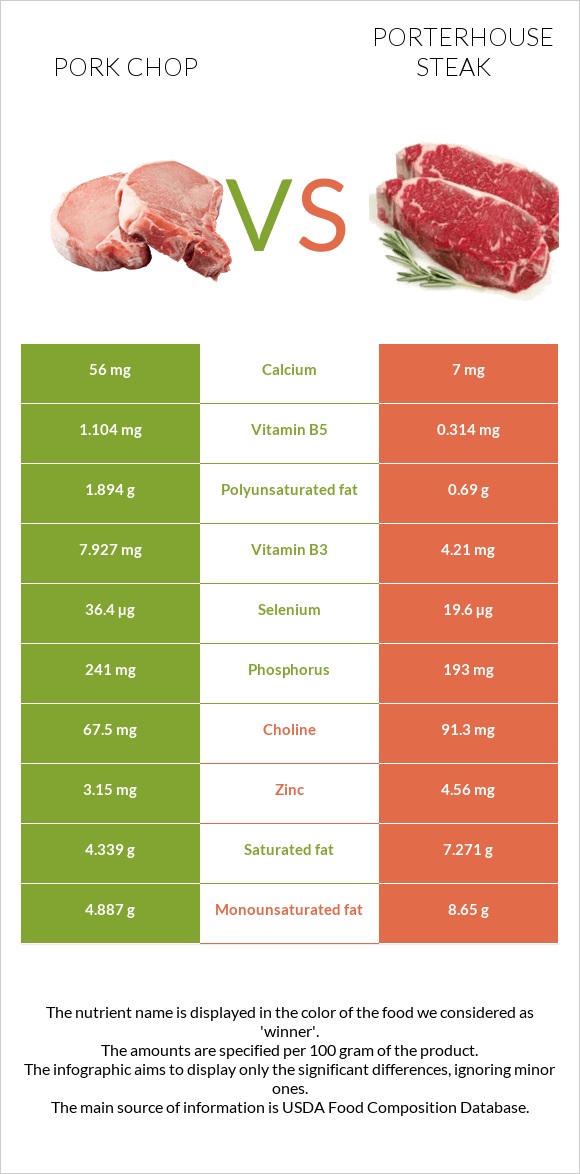Pork chop vs. Porterhouse steak — In-Depth Nutrition Comparison
Compare
How are pork chop and porterhouse steak different?
- Pork chop is higher in vitamin B1, selenium, vitamin B3, vitamin B5, vitamin B6, and phosphorus; however, porterhouse steak is richer in vitamin B12, iron, and zinc.
- Daily need coverage for vitamin B12 for porterhouse steak is 63% higher.
- Pork chop contains 5 times more vitamin B1 than porterhouse steak. While pork chop contains 0.49mg of vitamin B1, porterhouse steak contains only 0.099mg.
- Pork chop has less saturated fat.
Pork, fresh, loin, blade (chops), bone-in, separable lean, and fat, cooked, broiled and Beef, short loin, porterhouse steak, separable lean, and fat, trimmed to 0" fat, all grades, cooked, broiled are the varieties used in this article.
Infographic

Infographic link
Mineral Comparison
Mineral comparison score is based on the number of minerals by which one or the other food is richer. The "coverage" charts below show how much of the daily needs can be covered by 300 grams of the food.
| Contains more CalciumCalcium | +700% |
| Contains more PhosphorusPhosphorus | +24.9% |
| Contains more SeleniumSelenium | +85.7% |
| Contains more IronIron | +237.9% |
| Contains more CopperCopper | +23.8% |
| Contains more ZincZinc | +44.8% |
| Contains less SodiumSodium | -12.2% |
| Contains more ManganeseManganese | +50% |
Vitamin Comparison
Vitamin comparison score is based on the number of vitamins by which one or the other food is richer. The "coverage" charts below show how much of the daily needs can be covered by 300 grams of the food.
| Contains more Vitamin AVitamin A | +∞% |
| Contains more Vitamin EVitamin E | +16.7% |
| Contains more Vitamin DVitamin D | +∞% |
| Contains more Vitamin B1Vitamin B1 | +394.9% |
| Contains more Vitamin B2Vitamin B2 | +37.3% |
| Contains more Vitamin B3Vitamin B3 | +88.3% |
| Contains more Vitamin B5Vitamin B5 | +251.6% |
| Contains more Vitamin B6Vitamin B6 | +34% |
| Contains more Vitamin B12Vitamin B12 | +230.3% |
| Contains more FolateFolate | +∞% |
All nutrients comparison - raw data values
| Nutrient |  |
 |
DV% diff. |
| Vitamin B12 | 0.66µg | 2.18µg | 63% |
| Vitamin B1 | 0.49mg | 0.099mg | 33% |
| Selenium | 36.4µg | 19.6µg | 31% |
| Iron | 0.87mg | 2.94mg | 26% |
| Vitamin B3 | 7.927mg | 4.21mg | 23% |
| Vitamin B5 | 1.104mg | 0.314mg | 16% |
| Zinc | 3.15mg | 4.56mg | 13% |
| Saturated fat | 4.339g | 7.271g | 13% |
| Vitamin B6 | 0.489mg | 0.365mg | 10% |
| Monounsaturated fat | 4.887g | 8.65g | 9% |
| Fats | 14.35g | 19.27g | 8% |
| Polyunsaturated fat | 1.894g | 0.69g | 8% |
| Phosphorus | 241mg | 193mg | 7% |
| Vitamin B2 | 0.313mg | 0.228mg | 7% |
| Vitamin D | 40 IU | 5% | |
| Calcium | 56mg | 7mg | 5% |
| Vitamin D | 1µg | 5% | |
| Cholesterol | 78mg | 67mg | 4% |
| Choline | 67.5mg | 91.3mg | 4% |
| Copper | 0.105mg | 0.13mg | 3% |
| Calories | 231kcal | 276kcal | 2% |
| Folate | 0µg | 7µg | 2% |
| Protein | 23.72g | 23.96g | 0% |
| Magnesium | 20mg | 22mg | 0% |
| Potassium | 315mg | 299mg | 0% |
| Sodium | 74mg | 65mg | 0% |
| Vitamin A | 4µg | 0µg | 0% |
| Vitamin E | 0.21mg | 0.18mg | 0% |
| Manganese | 0.01mg | 0.015mg | 0% |
| Trans fat | 0.066g | N/A | |
| Tryptophan | 0.282mg | 0.259mg | 0% |
| Threonine | 1.043mg | 1.104mg | 0% |
| Isoleucine | 1.123mg | 1.228mg | 0% |
| Leucine | 1.952mg | 2.105mg | 0% |
| Lysine | 2.109mg | 2.233mg | 0% |
| Methionine | 0.65mg | 0.676mg | 0% |
| Phenylalanine | 0.985mg | 1.033mg | 0% |
| Valine | 1.2mg | 1.288mg | 0% |
| Histidine | 0.965mg | 0.775mg | 0% |
| Omega-3 - DHA | 0.001g | 0g | N/A |
| Omega-3 - ALA | 0.065g | N/A | |
| Omega-3 - DPA | 0.011g | 0g | N/A |
| Omega-6 - Gamma-linoleic acid | 0.003g | N/A | |
| Omega-6 - Eicosadienoic acid | 0.065g | N/A | |
| Omega-6 - Linoleic acid | 0.922g | N/A |
Macronutrient Comparison
Macronutrient breakdown side-by-side comparison
Protein:
23.72 g
Fats:
14.35 g
Carbs:
0 g
Water:
61.45 g
Other:
0.48 g
Protein:
23.96 g
Fats:
19.27 g
Carbs:
0 g
Water:
54.66 g
Other:
2.11 g
| Contains more WaterWater | +12.4% |
| Contains more FatsFats | +34.3% |
| Contains more OtherOther | +339.6% |
~equal in
Protein
~23.96g
~equal in
Carbs
~0g
Fat Type Comparison
Fat type breakdown side-by-side comparison
Saturated fat:
Sat. Fat
4.339 g
Monounsaturated fat:
Mono. Fat
4.887 g
Polyunsaturated fat:
Poly. Fat
1.894 g
Saturated fat:
Sat. Fat
7.271 g
Monounsaturated fat:
Mono. Fat
8.65 g
Polyunsaturated fat:
Poly. Fat
0.69 g
| Contains less Sat. FatSaturated fat | -40.3% |
| Contains more Poly. FatPolyunsaturated fat | +174.5% |
| Contains more Mono. FatMonounsaturated fat | +77% |





